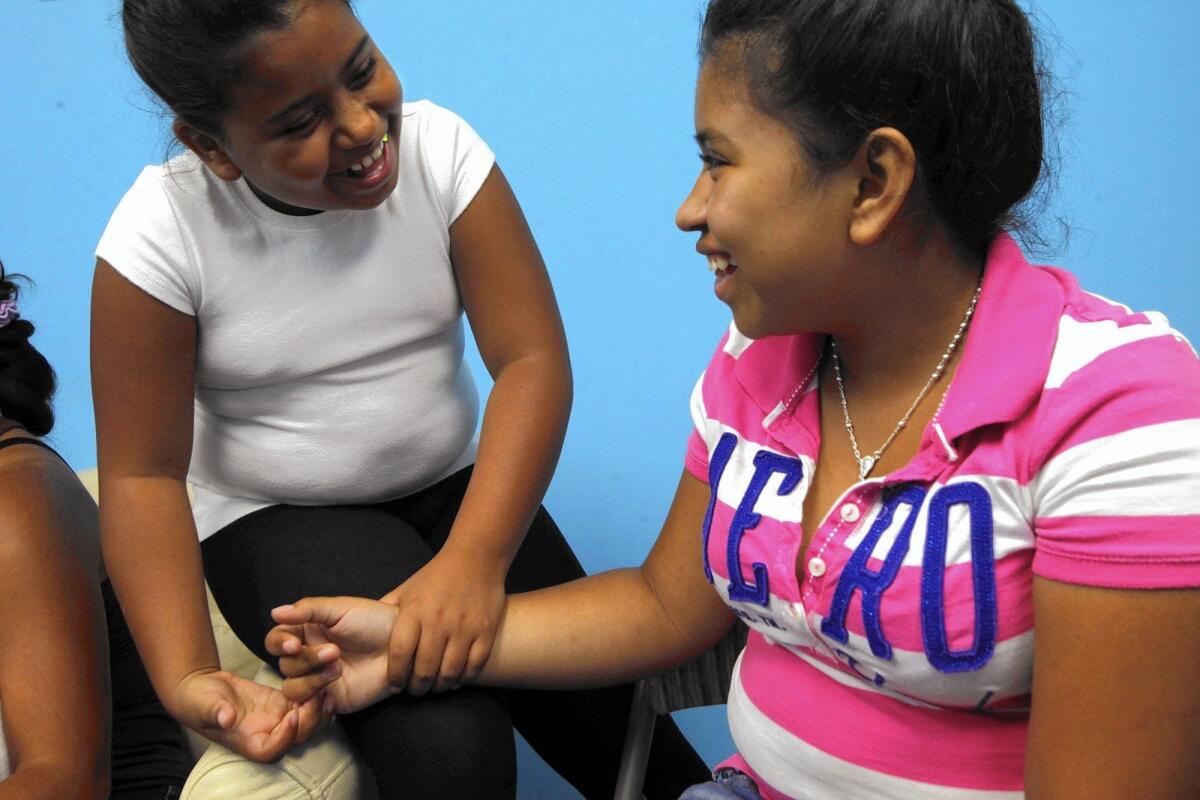Against the odds, Honduran sisters win their asylum case

- Share via
In October 2013, Silvia Padilla and her husband wired $8,000 to a coyote to smuggle their two daughters from Honduras to the United States. Gang violence in their hometown of Tegucigalpa was on the rise. In recent years, both girls had witnessed murders.
The sisters — Katheryn, 13, and Dayana, 9 — survived the dangerous journey across Mexico but were stopped by federal agents at the border. A few days later they were released to their parents in Los Angeles, with orders to appear in court for deportation proceedings. A pro bono attorney filed political asylum claims for the girls but warned the family: “The vast majority of these cases are denied.”
This week, in what the family views as a holiday miracle, an asylum officer granted their request. Katheryn and Dayana, whose story was featured in The Times, will be allowed to stay in the United States indefinitely.
“We are all so happy,” said Padilla, who, like her husband, Marvin Varela, came to the country illegally years ago to work.
The girls were part of an unprcedented wave of tens of thousands of Central American children, many of them unaccompanied, who crossed into the United States in the last year. Many said they were fleeing an uptick of gang violence in Honduras and El Salvador and asked for political aslyum.
Some constituencies in the U.S. who favor more restrictive immigration laws accused them of trying to game the system and use the asylum process as a back door.
In part to quell such fears, President Obama last summer directed immigration judges and asylum officers to fast-track the deportation proceedings of recently arrived immigrant children and their parents, which is why Katheryn and Dayana’s case was resolved so quickly.
With the help of Alex Holguin, an attorney from a legal aid clinic called El Rescate, the girls wrote about the violence they witnessed. Katheryn said she had watched gang members fatally shoot a spectator at a soccer match. Dayana said she had seen a friend of her father’s killed in a similar fashion.
Asylum cases are not easy to win, especially for people from Mexico and Central America.
To qualify, a person must have suffered persecution or have a well-founded fear of persecution because of race, religion, nationality, political opinion or membership in a particular social group. Though religious minorities — such as Christians in China — often have clear-cut claims based on that definition, many asylum officers and judges are less certain that a person who fears retribution from gang members should qualify.
In 2012, more than 10,000 people from China were granted asylum, compared with 126 Mexicans and 234 Hondurans, according to federal data.
Holguin said he was surprised by the outcome of Katheryn and Daya’s case and is hoping it marks a shift toward more compassionate treatment of gang-related claims.
“I hope this signals a little bit of loosening of the standards for asylum cases from Central America,” he said.
For Padilla, who was apart from her daughters for seven years, asylum status means more stability. When the girls first arrived in L.A., they had trouble adjusting to new schools and the strict rules of their parents. A year later, they are typical American kids, Padilla said. Katheryn plays on her school’s soccer team and is an honor student. Dayana, talkative and cheerful, “is the star of her class.”
In a year, the girls will be able to apply for legal permanent resident status. In five years, they can apply for full citizenship. Padilla and Varela are not eligible for a new program designed by Obama to grant work permits and a stay of deportation to some parents of U.S. citizen children.
Twitter: @katelinthicum
More to Read
Sign up for Essential California
The most important California stories and recommendations in your inbox every morning.
You may occasionally receive promotional content from the Los Angeles Times.











